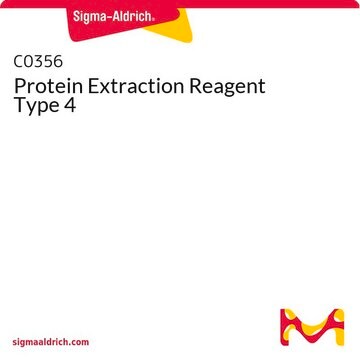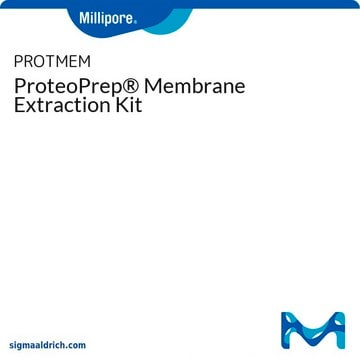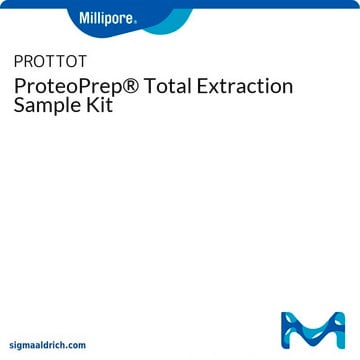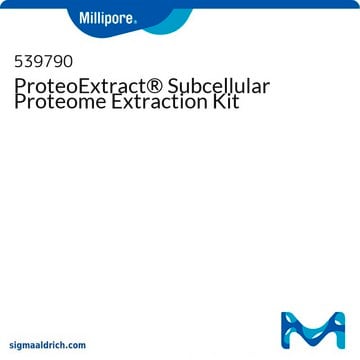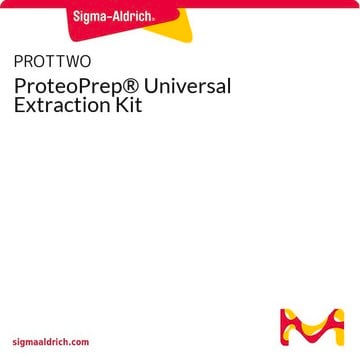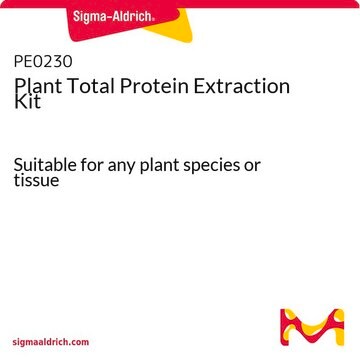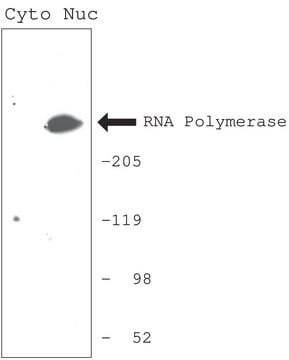Recommended Products
form
solid
General description
Protein Extraction Reagent Type 1 is a highly effective protein solubilization and extraction reagent composed urea, Trizma® and CHAPS.
Application
Premixed and prequalified, Protein Extraction Reagent Type 1 is a highly effective protein solubilization and extraction reagent based on conventional extraction formulations. Reducing and alkylating reagents TBP (cat# T7567) and iodoacetamide (cat# A3221) are recommended for use with this reagent. Protein Extraction Reagent Type 1 is available as a component of the ProteoPrep® Sample Extraction Kit (PROTTOT).
Components
Contains urea, Trizma® and CHAPS
Legal Information
ProteoPrep is a registered trademark of Merck KGaA, Darmstadt, Germany
Trizma is a registered trademark of Merck KGaA, Darmstadt, Germany
Storage Class Code
11 - Combustible Solids
WGK
WGK 3
Flash Point(F)
Not applicable
Flash Point(C)
Not applicable
Personal Protective Equipment
dust mask type N95 (US), Eyeshields, Gloves
Certificates of Analysis (COA)
Search for Certificates of Analysis (COA) by entering the products Lot/Batch Number. Lot and Batch Numbers can be found on a product’s label following the words ‘Lot’ or ‘Batch’.
Already Own This Product?
Find documentation for the products that you have recently purchased in the Document Library.
Customers Also Viewed
Andy Lo et al.
Analytica chimica acta, 788, 81-88 (2013-07-13)
Isotope labeling liquid chromatography-mass spectrometry (LC-MS) is a major analytical platform for quantitative proteome analysis. Incorporation of isotopes used to distinguish samples plays a critical role in the success of this strategy. In this work, we optimized and automated a
Yiming Deng et al.
Translational stroke research, 11(5), 950-966 (2020-01-31)
Ischemic stroke is associated with various physiological and pathological processes including neuronal apoptosis. Growth-arrest-specific transcript 5 (GAS5), a long non-coding RNA (lncRNA), has been recently reported to affect ischemic stroke-induced neuron apoptosis, while its mechanisms remain largely undefined. Through in silico
Xiaomeng Yi et al.
Experimental cell research, 383(2), 111454-111454 (2019-06-07)
Mesenchymal stem cells (MSCs) have been widely documented for their potential role in the treatment of various clinical disorders, including acute lung injury (ALI). ALI represents a clinical syndrome associated with histopathological diffuse alveolar damage. Recent evidence has demonstrated that
Peng Teng et al.
Journal of cellular biochemistry, 119(7), 5243-5252 (2017-12-14)
This study aims to evaluate the effect of the regulatory relationship between microRNA-383 (miR-383) and PARP2 in the cell migration and invasion in human with cervical cancer (CC) via the PI3K-AKT-MTOR signaling pathway. Cancerous tissues and corresponding paracancerous tissues were
Mallikarjun Gadwala et al.
Applied biochemistry and biotechnology, 169(4), 1459-1466 (2013-01-15)
The outstanding capability of two-dimensional gel electrophoresis in separating all types of proteins basically depends on the efficiency of sample preparation. Sample preparation is one of the most critical steps in two-dimensional gel electrophoresis. Unfortunately, due to severe solubility, resolution
Our team of scientists has experience in all areas of research including Life Science, Material Science, Chemical Synthesis, Chromatography, Analytical and many others.
Contact Technical Service